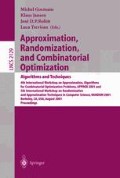Abstract
We discuss two approximation approaches, the primal-dual schema and the local-ratio technique. We present two relatively simple frameworks, one for each approach, which extend known frameworks for covering problems. We show that the two are equivalent, and conclude that the integrality gap of an integer program serves as a bound to the approximation ratio when working with the local-ratio technique.
Access this chapter
Tax calculation will be finalised at checkout
Purchases are for personal use only
Preview
Unable to display preview. Download preview PDF.
References
V. Bafna, P. Berman, and T. Fujito. A 2-approximation algorithm for the undirected feedback vertex set problem. SIAM J. on Disc. Math., 12(3):289–297, 1999.
A. Bar-Noy, R. Bar-Yehuda, A. Freund, J. Naor, and B. Shieber. A unified approach to approximating resource allocation and scheduling. In 32nd ACM Symposium on the Theory of Computing, 2000.
R. Bar-Yehuda. One for the price of two: A unified approach for approximating covering problems. Algorithmica, 27(2):131–144, 2000.
R. Bar-Yehuda and S. Even. A linear time approximation algorithm for the weighted vertex cover problem. Journal of Algorithms, 2:198–203, 1981.
R. Bar-Yehuda and S. Even. A local-ratio theorem for approximating the weighted vertex cover problem. Annals of Discrete Mathematics, 25:27–46, 1985.
R. Bar-Yehuda and D. Rawitz. Efficient algorithms for bounded integer programs with two variables per constraint. Algorithmica, 29(4):595–609, 2001.
A. Becker and D. Geiger. Approximation algorithms for the loop cutset problem. In 10th Conference on Uncertainty in Artificial Intelligence, pages 60–68, 1994.
D. Bertsimas and C. Teo. From valid inequalities to heuristics: A unified view of primal-dual approximation algorithms in covering problems. Operations Research, 46(4):503–514, 1998.
F. A. Chudak, M. X. Goemans, D. S. Hochbaum, and D. P. Williamson. A primaldual interpretation of recent 2-approximation algorithms for the feedback vertex set problem in undirected graphs. Operations Research Letters, 22:111–118, 1998.
G. B. Dantzig, L. R. Ford, and D. R. Fulkerson. A primal-dual algorithm for linear programs. In H. W. Kuhn and A. W. Tucker, editors, Linear Inequalities and Related Systems, pages 171–181. Princeton University Press, 1956.
E. W. Dijkstra. A note on two problems in connexion with graphs. Numerische Mathematik, 1:269–271, 1959.
S. Even, A. Itai, and A. Shamir. On the complexity of timetable and multicommodity flow problems. SIAM J. on Comp., 5(4):691–703, 1976.
L. R. Ford and D. R. Fulkerson. Maximal flow through a network. Canadian Journal of Mathematics, 8:399–404, 1956.
M. X. Goemans and D. P. Williamson. A general approximation technique for constrained forest problems. SIAM J. on Comp., 24(2):296–317, 1995.
M. X. Goemans and D. P. Williamson. The primal-dual method for approximation algorithms and its application to network design problems. In [17], chapter 4.
D. Gusfield and L. Pitt. A bounded approximation for the minimum cost 2-SAT problem. Algorithmica, 8:103–117, 1992.
D. S. Hochbaum, editor. Approximation Algorithms for NP-Hard Problem. PWS Publishing Company, 1997.
D. S. Hochbaum. A framework of half integrality and good approximations. Manuscript, UC berkeley, 1997.
K. Jain and V. V. Vazirani. Primal-dual approximation algorithms for metric facility location and k-median problems. In 40th IEEE Symposium on Foundations of Computer Science, pages 2–13, 1999.
H. W. Kuhn. The Hungarian method of solving the assignment problem. Naval Research Logistics Quarterly, 2:83–97, 1955.
D. P. Williamson, M. X. Goemans, M. Mihail, and V. V. Vazirani. A primal-dual approximation algorithm for generalized Steiner network problems. Combinatorica, 15:435–454, 1995.
Author information
Authors and Affiliations
Editor information
Editors and Affiliations
Rights and permissions
Copyright information
© 2001 Springer-Verlag Berlin Heidelberg
About this paper
Cite this paper
Bar-Yehuda, R., Rawitz, D. (2001). On the Equivalence between the Primal-Dual Schema and the Local-Ratio Technique. In: Goemans, M., Jansen, K., Rolim, J.D.P., Trevisan, L. (eds) Approximation, Randomization, and Combinatorial Optimization: Algorithms and Techniques. RANDOM APPROX 2001 2001. Lecture Notes in Computer Science, vol 2129. Springer, Berlin, Heidelberg. https://doi.org/10.1007/3-540-44666-4_7
Download citation
DOI: https://doi.org/10.1007/3-540-44666-4_7
Published:
Publisher Name: Springer, Berlin, Heidelberg
Print ISBN: 978-3-540-42470-3
Online ISBN: 978-3-540-44666-8
eBook Packages: Springer Book Archive

